


Artificial intelligence (AI) for recruiting is capable of revolutionizing the talent acquisition process, by enabling machine learning to learn how to select your ideal applicant and automate manual procedures in the hiring process. This technology is intended to expedite or automate some aspects of the recruiting process, particularly those that are repetitive and high-volume. AI can bring in software that does sentiment analysis on job descriptions to uncover potentially biased wording or software that uses machine learning to resume to auto-screen candidates. AI recruiting tools can use the plethora of data that recruiters have on their talent pool to generate valuable insights. Recruiters may use artificial intelligence to aid with blind screening to remove prejudice and visibility into previous successful prospects who have stayed with the company.
Though AI is rapidly changing the recruitment environment, it is impossible to ignore the fallacies that appear as we learn to apply the technology. Here are some of the most common myths about AI in recruitment: –
AI will replace recruiters and will alter the function of the recruiter by assisting them in completing business procedures and becoming more proactive, but it will not replace them. While AI for recruitment can automate several operations that are presently performed manually, technology cannot yet replace all of them. Humans and AI will collaborate, resulting in increased efficiency and improved HR procedures. These procedures need social skills, empathy, and bargaining ability, which AI technology cannot currently provide.
AI RECRUITMENT TOOLS ARE COMPLICATED TO USE
Although AI recruitment tools are not difficult to use, they do take some time and effort. You will be able to extend your talent pool and spend less time on talent acquisition once you and your teams are familiar with the software’s features. This allows you to spend more time onboarding applicants. Artificial intelligence has been easily incorporated into a variety of user-friendly recruiting tools that you are likely already familiar with. Most recruiting task forces already use an ATS (Applicant Tracking System) that includes some form of AI. AI is only a tool, and service providers may assist you in easily using it to meet your recruitment goals.
AI IS ONLY BENEFICIAL TO LARGE CORPORATIONS
Larger firms gain the most from AI since it helps with mass hiring, but AI hiring software may help both large and small businesses do more than just speed up the recruiting process. By optimising which job boards your advertisement is posted on, ad placement software may help you lower your cost-per-hire. Your company is more likely to locate the right applicant without wasting time and money. AI may provide a small organisation with a lean operation with the insights and resources that much larger corporations have. They can use AI technology to source candidates, allowing a recruiter to focus on in-person interviews and contract negotiations.
AI RECRUITMENT SOFTWARE IS EXPENSIVE
While high-quality AI hiring software is not free, it can save your company money in the long run. AI-based recruiting software might significantly reduce resource costs and operating time. And, because time is money these days, saving overheads are just as valuable. The financial ramifications of any hiring activity are critical for HR executives. And if you can save money on that, you can use the money towards other departmental operations that will bring greater value to prospects or current workers and make a significant impact.
AI ALGORITHMS ARE BIASED
Recruiting biases, both conscious and unconscious, frequently enter into the process, resulting in the rejection of deserving candidates. However, instead of creating bias in hiring, AI helps to mitigate it. AI evaluates all data points objectively, reducing preconceptions, mental weariness, and prejudice that humans are prone to. However, this is contingent on how the AI is built, as these systems are capable of mimicking the bias of the people who created them. The truth is that AI is exactly what we train it to be. The question is whether we can teach it better than we were taught.
The author is Vice President, MS Rvantage